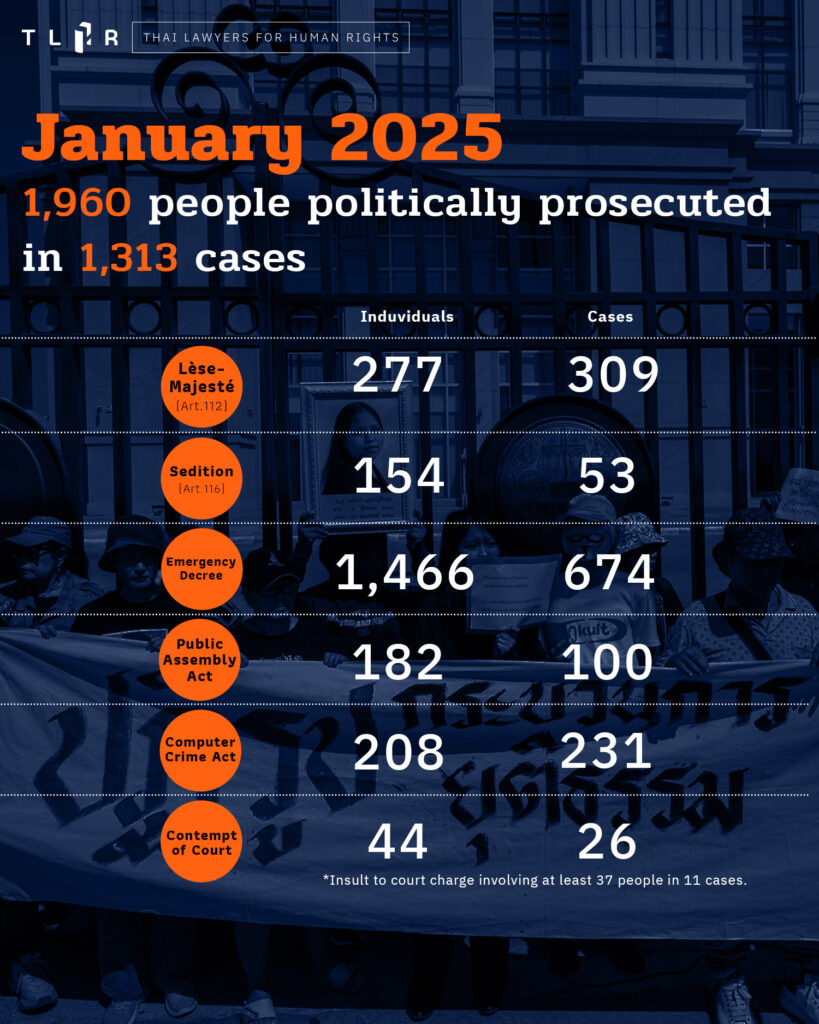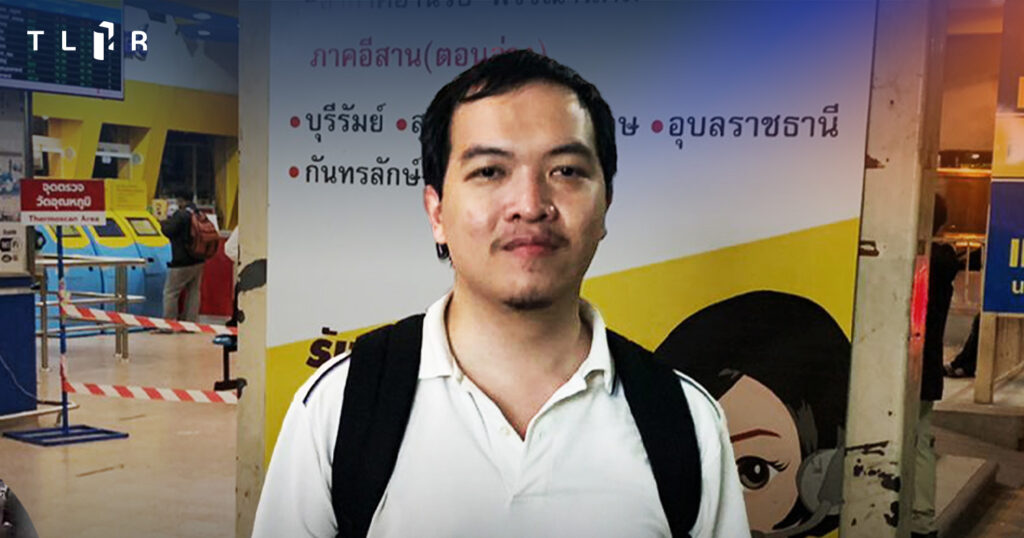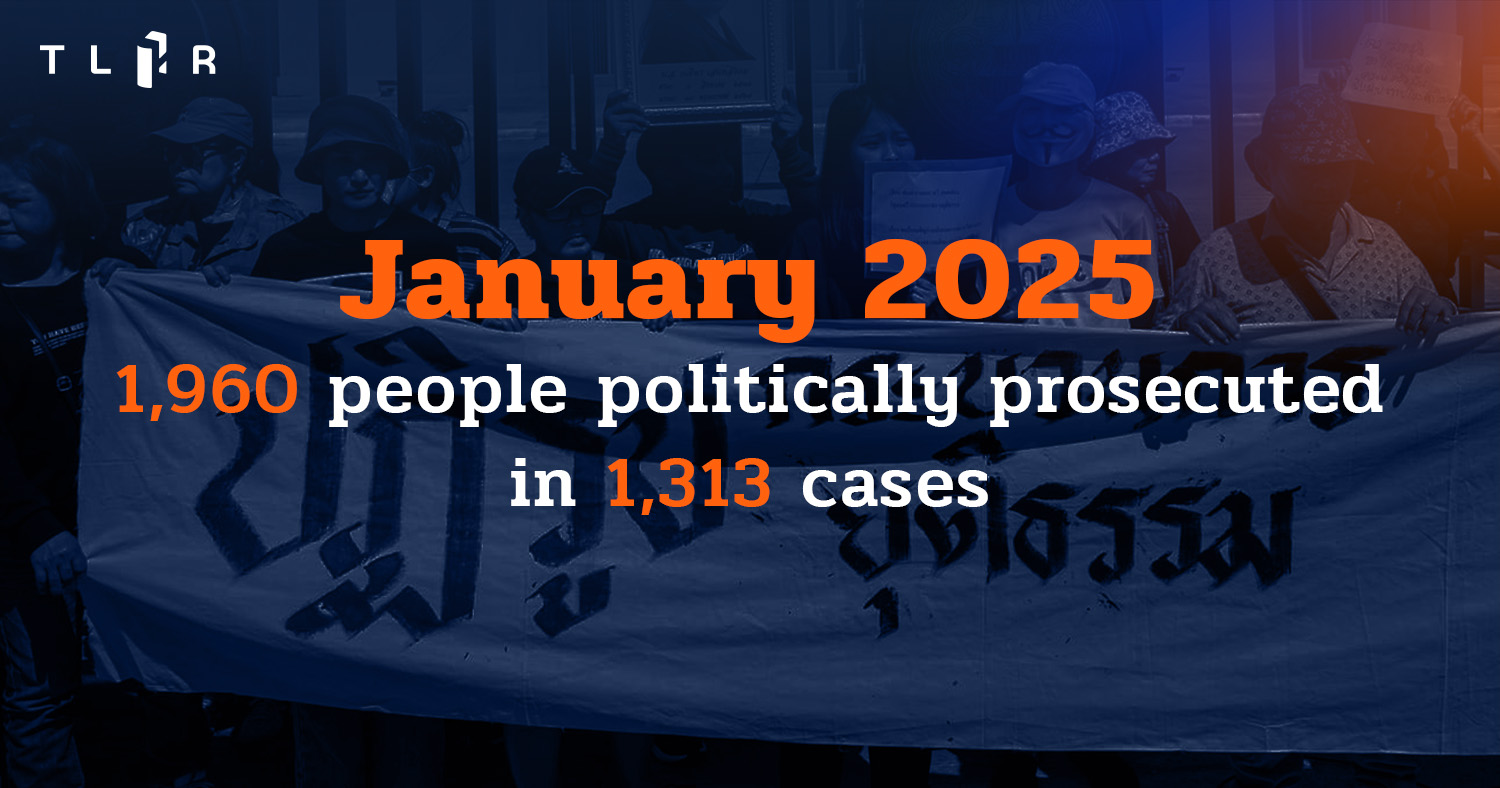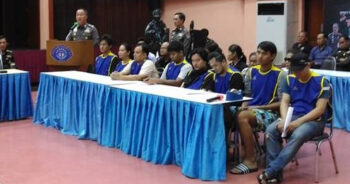In January 2025, two new cases involving political expression emerged. These included the Section 112 case against “Busbas,” now facing his fourth Section 112 charge, and Arnon Nampa, who was charged under contempt of court following his act of protest – the removal of his shirt in the courtroom. Moreover, an activist in Nakhon Ratchasima province was charged under Section 112 in connection with their participation in a previous public assembly.
Meanwhile, courts at various levels have gradually issued rulings in six Section 112 cases, sentencing the defendants to prison. However, the outcomes of their bail requests have varied; some defendants have been granted bail, while others have not. Additionally,five cases under violations of the Emergency Decree were initiated. Notable cases included the case against 45 Wevo guards and members of the public, in which the Criminal Court dismissed the main charges. There were also two cases under the Computer Crime Act pending in the Courts of Appeal. Notably, the Court of Appeal upheld the conviction in the case involving the hacking of the Constitutional Court’s website to express political views, while it dismissed the case related to sharing posts about Gen Prawit Wongsuwan.
According to the Thai Lawyers for Human Rights’, from the “Free Youth” public assembly on 18 July 2020 until 31 January 2025, at least 1,960 individuals have been charged/prosecuted for participating in public assemblies or expressing their political opinions in 1,313 cases. In comparison to December 2024, there are two new cases.
Altogether, there have been at least 4,025 criminal cases against individuals, although some of them are charged for multiple offences.
Prosecution statistics in key offences;
1. Section 112 (lèse-majesté) of the Criminal Code, at least 277 individuals in 309 cases (Of this, at least 163 cases have stemmed from reports to the police made by members of the public.)
2. Section 116 (sedition) of the Criminal Code, at least 154 individuals in 53 cases
3. Violation of the Emergency Decree, at least 1,466 individuals in 674 cases
4. Violation of the Public Assembly Act, at least 182 individuals in 100 cases
5. Violation of the Computer Crimes Act, at least 208 individuals in 231 cases
6. Contempt of court, at least 44 individuals in 26 cases, and insult of the court, at least 37 individuals in 11 cases
Of 1,313 cases, 662 cases have reached their final verdicts (although some cases remain outstanding, since certain defendants decided to appeal the verdicts, while others have not).
.

.
Prosecution trend in January 2025 and key events;
“Busbas” facing his fourth Section 112 case – one Korat’s activist retrospectively charged despite not making speech concerning the monarchy – rulings made in six Section 112 cases
The first month of 2025 saw one new Section 112 case including the case against Mongkol “Busbas” Thirakot. Investigators from the Technology Crime Suppression Division traveled to Chiang Rai Central Prison to press charges against him, based on three Facebook posts from 2022. The case had been filed by Arnon Klinkaew from the People’s Center for the Protection of Monarchy (SPPS) back in 2022, though the police only recently pressed charges against Busbas, who denied all accusations. This marks his fourth Section 112 case.
In addition, another individual was charged for violating Section 112 in connection with an existing public assembly, namely the case against an activist from Korat. Previously, only one person had been charged in relation to the livestreaming of the “112-Minute Stand to Stop Detention” at Thao Suranari Monument on April 17, 2021. Over a year later, police from Muang Nakhon Ratchasima Police Station summoned Waranyu “Book” Kongsittham to face charges under Section 112 after public prosecutors instructed them to add an additional charge. He was accused of conspiring with another suspect and making a remark during the livestream, even though Book did not comment on the monarchy. Book had never previously been charged under Section 112.
.
.
In Section 112 cases, rulings in at least six cases were made throughout January, three in the Lower Courts and another three in the Courts of Appeal, in which the Courts found the defendants guilty in all cases. However, bail decisions varied from case to case.
Of the three cases in which the defendants pled guilty, including the case against Prasong, a member of the public from Lopburi province who was accused of posting two messages, the Court of Appeal upheld the previous verdict and sentenced him to a total of three years in prison. However, he was granted bail pending his trial with the Supreme Court. In the case against Sathaphon, who made a symbolic gesture during the passing of the royal motorcade at the Democracy Monument, the Criminal Court convicted and sentenced him to one year and six months in prison. In the case against Chiratchaya, who allegedly made a remark during a livestream in 2021, the Criminal Court convicted and sentenced her to two years in prison. In both of the latter cases, the lower courts referred their bail applications to the Courts of Appeal, which decided not to allow bail in either case. As a result, two more individuals were imprisoned in Section 112 cases.
As for the three cases in which the defendants pled not guilty, including the case against “Jai,” a new graduate from a university in Bangkok accused of tweeting a photo and a caption about King Rama IX, the Court of Appeals upheld the previous verdict, finding him guilty and sentencing him to two years in prison. Although the late King is not explicitly covered under Section 112 of the Criminal Code, the court determined that his image and the message could be interpreted as a violation.
In the case against “Port Faiyen,” who was accused of posting three messages in 2016, the Court of Appeals also upheld the previous verdict, convicting and sentencing him to six years in prison. Notably, the verdict stated that Section 112 applies to past monarchs as well, reasoning that any violation against them can affect the reigning monarch, despite the three messages being posted during the reign of King Rama IX.
Lastly, in the case against “Bang-urn,” who was accused of posting a doctored photo of members of the royal family on Facebook, the Criminal Court also convicted him and sentenced him to three years in prison, ruling that he had insulted King Rama X.
It is worth noting that in all three cases, the defendants were allowed to post bail pending their trials in the Court of Appeals and the Supreme Court. In the cases against “Jai” and “Bang-urn,” the Criminal Courts granted bail without referral. However, in the case against “Port,” the Criminal Court referred his bail application to the Supreme Court, which, after detaining him for four days, eventually granted his bail request.
The bail situation in Section 112 cases remains highly unpredictable and uncertain throughout this month as it did throughout 2024. Some defendants were granted bail despite being sentenced to imprisonment by either the Lower Courts or the Courts of Appeals, while others were denied bail even when they posed no flight risk. In some instances, the two tiers of courts made different rulings on the same issue, with one granting bail while the other denied it. In cases where the sentence was not severe, the Lower Courts sometimes granted bail without referrals, but in similar cases, they referred the decision to the Courts of Appeal or the Supreme Court. This inconsistency highlights the uncertainty surrounding bail decisions in Section 112 cases.
A summary of verdicts in Section 112 cases
January 2025
| Court | Case | Verdict |
| Court of Appeals | Prasong “Dong” Kotsongkhram, member of the public, 29Posting and sharing two Facebook messagesDuring May-June 2021 | Verdict upheldTwo-year-and-12-month-prison sentenceWithout suspensionAllowed to post bail |
| Criminal Court | Chiratchaya “Jinny” Sakulthong, 56Livestreaming via personal Facebook while travelling to participate in #Mob25JulyLightingCandlesToTopplePrimeMinister | Convicted and sentenced to four-year-prison sentence, reduced to two yearsWithout suspension |
| Criminal Court | Sathaphon, from Ubonratchathani, 33Making symbolic gesture during the passing of royal motorcade of King Rama X and Queen Suthida around Democracy Monument in 2022 | Convicted and sentenced to three-year-prison sentence, reduced to one year and six monthsWithout suspension |
| Court of Appeals | “Jai”, student, 24Tweeting speech by King Rama IX with caption in 2020 | Verdict upheldTwo-year-imprisonmentWithout suspensionAllowed to post bail |
| Court of Appeals | “Port Faiyen”, former vocalist and musician of Faiyen BandPosting Facebook message alluding that the Turkish coup was not successful as no King to sign off, and posting lyric and message in two posts in 2016 | Verdict upheldSix-year-prison sentenceWithout suspensionAllowed to post bail |
| Criminal Court | “Bang-urn”, freelance artists from Khon Kaen, 26Posting photo of royal family members with caption on 15 March 2022 | Convicted and sentenced to Four-year-prison sentence, reduced to three yearsWithout suspensionAllowed to post bail |
.
Rulings made in five public assembly cases for violating the Emergency Decree, resulting in acquittals for Wevo guards
In January, rulings were made by various courts in five political public assembly cases which took place when the state of emergency was declared following the Covid-19 outbreak.
Key cases included the case against the Wevo guards and 45 other individuals, who were arrested at Major Ratchayothin before the start of #Mob6Mar64. They were accused of violating the following: the Emergency Decree, Section 301 (being members of a secret society or criminal association) of the Criminal Code, and evading arrest. Several of them were also physically assaulted by officers during their arrest. The Criminal Court ruled to dismiss all four charges. The Court found that the Wevo group had not intended to act unlawfully, as claimed by the prosecution, and concluded that the prosecution failed to demonstrate how the defendants gathered in a crowded place or how it constituted an illegal assembly.
However, the court imposed penalties on some of the defendants for charges of possessing weapons (armored vests) and possessing radio communication devices without permission, with both fines and prison sentences, though the sentences were suspended. There was one case where a defendant was sentenced to two months and 20 days in prison and had previously been imprisoned in another political case, so the court did not suspend his sentence. However, he was still granted bail during the appeal.
.
.
In four other cases, the courts found the defendants guilty of violating the Emergency Decree. These included the public assembly case #RatsadonUpholdingLimits on 24 June 2021, where 33 people were indicted. The Dusit Kwaeng Court fined each defendant 6,000 baht, finding that the public assembly was held without the disease prevention measures required by law.
In the case involving a couple arrested while driving away from the protest site during #Mob29August64 at Din Daeng, the Court of Appeal upheld the previous verdict, concluding that both individuals participated in the protest. However, there was no evidence proving that they used violence against police officers, thus they were not found guilty under Section 215. Instead, they were sentenced under the Emergency Decree to six months in prison, with a fine of 5,000 baht each, with their sentences suspended.
In the case against “Mike” regarding the “Who ordered the abduction of Wanchalerm Satsaksit” activity in Rayong Province on 14 June 2020, the Lower Court originally dismissed the case, ruling that the activity lasted only 40 minutes, the defendant wore a mask the entire time, the activity was held in an open space, and COVID-19 measures had been relaxed during that period. However, after the public prosecutors appealed, the Court of Appeals Region 2, reversed the decision, stating that the activity was a gathering in a public space with many people, which posed a risk of spreading the disease. The court sentenced Mike to one month in prison.
Additionally, there was a case involving a youth – “Ton Or,” who participated in the CarMob #15Aug64. The Court of Appeals for Specialized Cases upheld the previous verdict, finding the defendant guilty and imposing a fine of 4,000 baht. The court noted that even though other adults involved in the same event had been acquitted, that decision did not affect this case.
The trend of rulings in cases under the Emergency Decree related to political gatherings remains difficult to predict. In cases where the defendants pled not guilty, the courts tended to dismiss the charges over finding them guilty. However, there were two distinct types of rulings. One approach emphasized balancing the right to assembly with the pandemic situation. If the protesters had sufficient preventive measures and did not gather in a crowded space, the cases were often dismissed. On the other hand, some courts deemed that merely organizing a gathering during the emergency decree period was enough to consider it illegal.
.
.
Arnon faces contempt of court for removing his shirt in the courtroom. Meanwhile, in a case against six activists, the Supreme Court is revising the penalty to have them detained instead
In January, the Criminal Court initiated a case against Arnon Nampa for contempt of court for removing his shirt in the courtroom as a form of protest. This protest was in response to the court’s refusal to subpoena documentary evidence that he considered crucial for his legal defense in the case involving the #HarryPotter1protest. The Criminal Court initiated the contempt of court case against Arnon for this action.
On January 23, Arnon was brought to court by the authorities without prior notice, including to Arnon himself, where there was an attempt to conduct a trial on the contempt of court charge immediately, without any lawyers present. However, the trial was postponed and rescheduled for March 5, 2025.
Additionally, there was a case involving six activists who were charged with contempt of court for allegedly live-streaming on Facebook and writing messages on the walls of their detention room after the court denied them bail. This was in relation to the public assembly case in front of the Border Patrol Police Region 1 Headquarters on 9 August 2021. This case went all the way to the Supreme Court, which amended the punishment to a suspended-10 days of detention and a 500-baht fine for each defendant. The detention sentence was suspended for one year. This revised decision contrasts with the previous Court of Appeal ruling, which did not grant a suspended sentence. The Supreme Court’s ruling means the case is now concluded.
.

.
Two Computer Crime cases reached the Court of Appeals: Court upheld previous verdict to imprison defendant who allegedly hacked the Constitutional Court’s website, while the case concerning the sharing of KonthaiUK page’s posts was dismissed
In the past month, two significant Computer Crime Act cases had their verdicts rendered by the Court of Appeals. One case involved Wachira, who was charged under Sections 5, 7, 9, and 10 of the Computer Crime Act for hacking into and making alterations to the Constitutional Court’s website. He changed the website’s title to ‘Kangaroo Court’ on 11 November 2021, as a form of political expression regarding the Court’s ruling that calls for reform by the core members of the pro-democracy movement were tantamount to “overthrowing the constitutional monarchy.”
Wachira pleaded guilty in this case, and the Court of Appeal upheld the previous verdict. He was sentenced to one year and six months in prison and ordered to pay civil damages of 87,227 baht. However, the court adjusted the interest rate on the damages, ruling that it should be no less than 2 percent but not exceeding 5 percent. Despite this, he was granted bail pending his appeal to the Supreme Court.
The second case involved three individuals who were charged under Section 14(2) of the Computer Crime Act for sharing posts from the “KonthaiUK” (Thai People in the UK) Facebook page. The posts contained content about General Prawit Wongsuwan during his time as Deputy Prime Minister, when the National Council for Peace and Order (NCPO) was in power in 2018.
The Lower Court had originally sentenced all three individuals to eight months in prison without suspension. The Courts of Appeal overturned the previous decision, acquitting the three defendants in this case, stating that the prosecution’s evidence did not prove that the defendants had imported false information into the computer system that affected national security or was likely to cause panic among the public.
The trend of cases related to online expression under the Computer Crime Act, especially those without accompanying security-related charges, remains a developing issue that warrants close attention.


